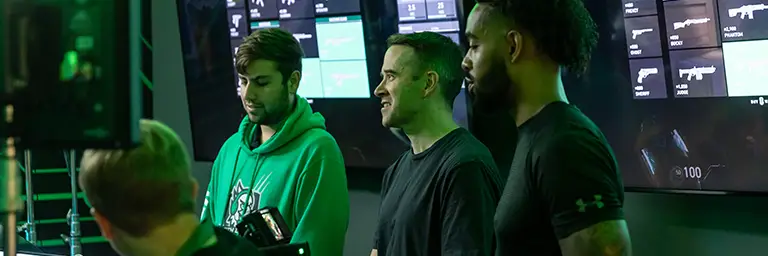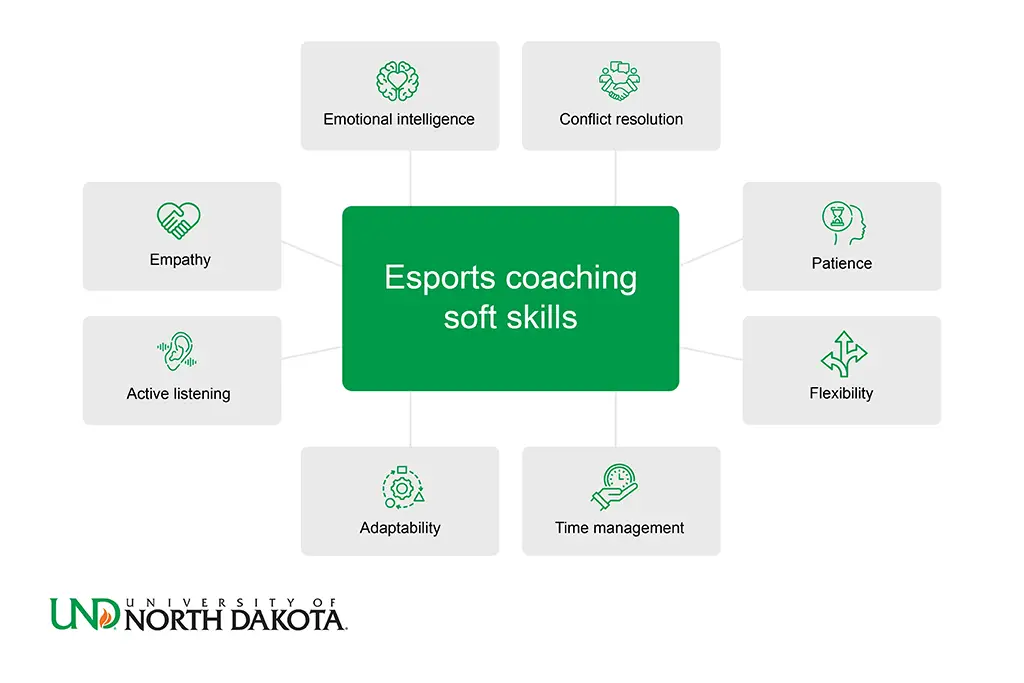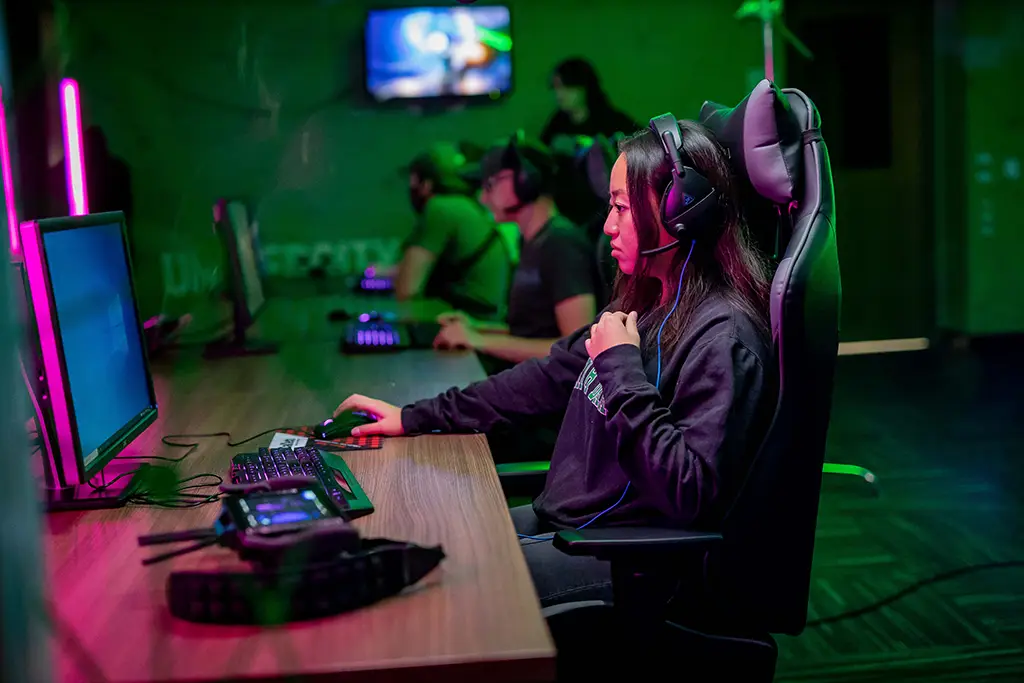
Learn How to Become an Esports Coach and Thrive
To become an esports coach, you need a combination of in-depth game knowledge, leadership skills, hands-on coaching experience, and possibly formal education or certifications in esports or coaching.
Request Information
It's incredible to think that something as fun and engaging as esports, which for so many is a true passion, can now be an actual career choice. What's even more exciting is that esports doesn't just offer one career path, like becoming a professional player. There are actually a variety of roles for those who want to be part of the industry, including that of coach.
Cindy Juntunen, former dean of the College of Education & Human Development (CEHD) at UND, points out that "Traditionally, coaches evolve out of really good players." While it's true that many great coaches have come from the ranks of top players, that's not the only way to break into coaching.
So, if not through experience as a player, how to become an esports coach?
The Role of Education in Becoming an Esports Coach
Education equips aspiring coaches with a much deeper understanding of gaming theory and team management. The structured guidance it provides can help accelerate your growth, make you more versatile and better prepared to train others in esports.
Bachelor's Degree in Esports
As esports grows in popularity, formal education programs dedicated to this industry are becoming more widespread. A bachelor's degree in esports is a prime example of how universities are adapting to this booming field, providing students with academic training in game theory, esports management, and business strategy.
UND is leading the way in North Dakota as the first among the state's colleges and universities to offer a Bachelor of Science in Esports. Eric Link, UND's provost and vice president for academic affairs, stated, "This interdisciplinary degree program is innovative, challenging and at the cutting edge of new developments in academic programming across the country."
The program includes a requirement for an internship experience, which will give students practical exposure while also tying into UND's active varsity esports teams, which compete in titles such as Rocket League, League of Legends, and Super Smash Bros. The competitive environment enhances the learning experience, giving students the chance to apply what they've learned in real-world gaming scenarios. As UND's former esports director Travis Isbell explained, "One could see the esports undergraduate degree being the rising tide that lifts all boats within UND's esports community."
UND also offers a minor in Esports Coaching, which provides specialized courses in gaming-related coaching techniques, athlete development, and the history of esports.
Relevant Certifications and Training
In addition to formal degrees, certifications and specialized training programs can help further develop the skills needed to become a successful esports coach.
Certifications focusing on specific areas, such as game analytics, leadership, team management, and even specialized gaming strategies, can significantly enhance your coaching capabilities. For example, a certification in game analytics can help you understand player data, performance metrics, and how to make data-driven decisions during gameplay, especially if new strategies or changes are introduced to the field.
What makes certifications particularly appealing is their flexibility. They can often be completed at your own pace, making them ideal for individuals who are already working or gaining practical experience in esports.
Self-education and Continuous Learning
As an aspiring coach, it's crucial to stay updated with the latest game patches and meta shifts to ensure that your coaching methods remain relevant and effective. While a degree can provide a solid foundation in game theory, management, and leadership, ongoing education allows you to stay on top of changes and advancements.
Game developers frequently release patches that alter mechanics, balance characters, and introduce new elements, all of which can significantly affect competitive gameplay. A good esports coach must understand these changes as well as know how to adapt their team's strategies accordingly.
In addition to keeping up with game updates, continuous learning also involves expanding your knowledge in areas like performance psychology, team dynamics, and game analytics. Engaging with webinars, conferences, and esports communities allows aspiring coaches and established coaches alike to learn from industry leaders and peers, gaining insights into new coaching techniques and team management practices.
Committing to self-education throughout your career enables you to grow and adapt, which is crucial in an industry that never stays still. This combination of formal education and ongoing self-learning equips you with the tools needed to lead your team to success.
Essential Skills and Knowledge Areas for Esports Coaching
Although the medium may be different for esports coaches and traditional sports coaches, the fundamental abilities required for effective coaching remain similar. Among the most essential skills for any coach to have is a deep understanding of the game they are coaching, the strategies needed to win, and the ability to communicate that knowledge to their players.
Game Expertise
A top esports coach must thoroughly understand the game mechanics, meta, and strategies that lead to victory. This expertise allows them to guide their players through tactical decisions, from team composition to in-game strategies.
Knowing the ins and outs of a game enables the coach to identify strengths and weaknesses, both within their team and the opposing side, and use that knowledge to adapt to changing scenarios. Game expertise is also key to staying current with the latest patches and updates, thus ensuring that the coach's guidance remains relevant and competitive.
Leadership and Communication
Leadership and communication are needed within teams to encourage a positive environment where players understand their roles and responsibilities and execute strategies effectively. An esports coach must be able to inspire their team while also maintaining discipline, just as a traditional sports coach would.
Communication skills are crucial when conveying tactics and gameplay feedback to the players so they can implement strategies during high-pressure matches. Effective leaders know how to balance constructive criticism with encouragement, keeping their team focused and united toward a common goal.
Analytical and Problem-solving Skills
Analytical and problem-solving skills are what enable esports coaches to identify areas for improvement and come up with solutions to overcome any weaknesses. A coach must be able to break down both individual and team performance, recognize patterns in play, and use the data gathered in order to make necessary adjustments.
Soft Skills
In addition to technical and strategic abilities, esports coaches need a variety of soft skills to manage teams and maintain positive dynamics. These skills include:
- Empathy
- Emotional intelligence
- Conflict resolution
- Patience
- Flexibility
- Time management
- Adaptability
- Active listening

Steps to Kickstart Your Career as an Esports Coach
Starting a coaching career in esports requires dedication, skill development, and strategic networking. Though the exact path one follows to become a successful esports coach can vary, there are several steps you can take to kickstart your career.
Start Coaching Amateur Teams
Realistically, you cannot expect to be trusted with the coaching position of a professional team when you don't have the wins, trophies, and overall credentials and experience for it. Therefore, one of the best ways to begin gathering experience and sharpening your skills is to start coaching amateur teams.
You can do so by volunteering to coach local or online teams that compete in smaller leagues or tournaments. Platforms like Discord or Reddit often have communities where amateur teams seek coaches.
The hands-on experience will help you better understand the responsibilities of coaching as well as provide you with the space to test your strategies and develop your communication skills with players.
Though you might see it as a step toward your preferred position and team, It's important to still treat this like a real coaching job because it is. So, work on improving individual and team performance, and make sure to provide constructive feedback.
Build your Personal Brand
In esports, building your personal brand is, at times, as important as honing your coaching skills. Your brand should reflect your expertise, coaching philosophy, and unique strengths.
Start by creating content through social media, YouTube tutorials, or streaming on platforms like Twitch, where you can share your coaching insights and showcase your understanding of the game. Regularly posting analyses of games, discussing strategies, or even offering free advice on forums can help you gain visibility in the esports community.
A strong online presence can attract players who want to work with you and also draw the attention of esports organizations looking for up-and-coming coaching talent. Establishing yourself as an authority in the community will be beneficial once you advance in your career.

Look for Opportunities in Esports Organizations
Once you've gained some experience and built a personal brand, the next step is to start looking for opportunities within esports organizations.
Keep an eye on job boards like Hitmarker, which specializes in gaming and esports job listings, or reach out directly to teams that align with your game specialization. It's also worth attending esports events and networking with professionals in the industry, as many jobs aren't posted publicly, and making connections can provide you with inside opportunities.
The Core Responsibilities of an Esports Coach
An esports coach is firstly responsible for teaching gameplay strategies to the players. But they do much more than that. They are also tasked with ensuring the overall well-being and development of their players.
Like any other coach, I'm responsible for preparing players for our weekly games at a training facility as well as during practice, scouting talent, setting the team's long-term goals, and ensuring a healthy atmosphere for players.Peter DunProfessional "League of Legends" Coach
Types of Esport Coaches
Esports teams, especially at a professional level, often have several types of coaches working together to focus on different areas of performance. While a head coach typically leads the team and oversees all aspects of training and strategy, other coaching roles provide more specialized support, such as:
- Strategic coaches focus on in-game tactics, team compositions, and strategies. They help prepare the team to face specific opponents by analyzing their strengths and weaknesses and ensuring players understand their roles and the overall game plan.
- Performance coaches help improve the players' physical and mental performance, working on everything from reaction times to stress management. They often collaborate with sports psychologists.
- Analytical coaches specialize in data analysis, reviewing in-game statistics and player performance metrics to identify areas of improvement.
Overcoming Common Challenges as an Esports Coach
The challenges sports coaches encounter in their role are similar to those faced by traditional sports coaches but with unique aspects specific to the gaming world. One major challenge is managing the team dynamics. The teams often consist of players with different backgrounds, personalities, and communication styles. It falls upon the coach to make sure that they all work together and resolve any conflict that arises.
Another significant challenge is staying up to date with constantly evolving game patches and updates. Since games frequently undergo balance changes that can alter gameplay mechanics, character strengths, or strategies, the coaches must be proactive in understanding these updates and adjusting their team's strategies accordingly.
Additionally, esports coaches must pay close attention to and address player burnout. Striking that balance between rest and intensive practice can be challenging, especially in a highly competitive environment where constant improvement is expected.
Conclusion
If you're passionate about esports, you don't need to be the one with a mouse or controller in hand in order to help your team win. Coaching allows you to be the mastermind behind the team and their victories.
At UND, we are committed to helping students turn their love for esports into a successful career. Join us, and let us coach you on how to lead the next generation of champions from behind the screens.
FAQs
Esports coaches earn an average salary of $61,121, but this can vary significantly depending on the team, with larger, more established teams offering much higher salaries.
Becoming an esports coach can definitely be challenging. You must have deep game knowledge, leadership skills, and experience before you can begin coaching professional teams. But, as with many other career paths, with dedication and the right preparation, it's achievable.
To build a successful esports team, focus on recruiting skilled and motivated players, encourage strong communication and teamwork, and continuously work on refining strategies based on game data and performance.